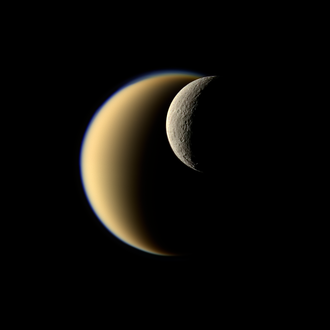
In astronomy, a regular moon or a regular satellite is a natural satellite following a relatively close, stable, and circular orbit which is generally aligned to its primary's equator. They form within discs of debris and gas that once surrounded their primary, usually the aftermath of a large collision or leftover material accumulated from the protoplanetary disc. Young regular moons then begin to accumulate material within the circumplanetary disc in a process similar to planetary accretion, as opposed to irregular moons, which formed independently before being captured into orbit around the primary.
Regular moons are extremely diverse in their physical characteristics. The largest regular moons are massive enough to be gravitationally rounded, with two regular moons—Ganymede and Titan—being larger than the planet Mercury. Large regular moons also support varied and complex geology. Several are known to have atmospheres, although only one regular moon—Titan—hosts a significant atmosphere capable of supporting weather and climate. As a result of their complexity, the rounded regular moons are often considered planetary objects in their own right by planetary scientists.[1] In contrast, the smallest regular moons lack active geology. Most are heavily cratered and irregular in shape, often resembling small asteroids and other minor bodies in appearance.
Six of the eight planets of the Solar System host 60 regular satellites[a] combined, with the four giant planets—Jupiter, Saturn, Uranus, and Neptune—hosting the most extensive and complex regular satellite systems. At least four of the nine likeliest dwarf planets also host regular moon systems: Pluto, Eris, Haumea, and Orcus.
Cite error: There are <ref group=lower-alpha> tags or {{efn}} templates on this page, but the references will not show without a {{reflist|group=lower-alpha}} template or {{notelist}} template (see the help page).